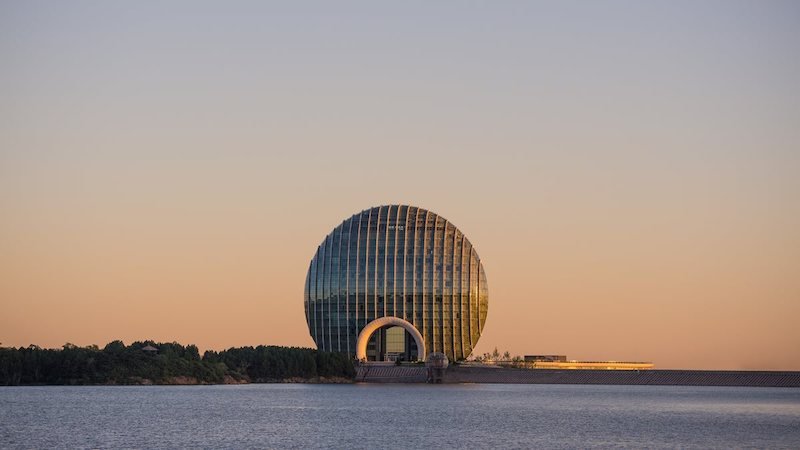Sunrise Kempinski Hotel Goes Back to Turning Down Beds, Not Guests
Hotels try to make a habit of turning down beds, not guests, so when Sunrise Kempinski Hotel Beijing opened its doors after an unprecedented sluggish three months, it was much to the delight of both its staff and visitors. The hotel, which has become famous for its unparalleled views of Yanqi Lake, initially shut down in late January, however, by mid-April, China’s mitigation efforts had successfully brought COVID-19 under control and Beijingers were eager to make the hour-long journey northward to Huairou, where they could bask in the glory of the resort’s natural beauty.
Over the course of the following few weeks, Sunrise Kempinski’s team was able to refine and perfect their epidemic prevention and control procedures, such that when the long May Day holiday arrived, the grounds were operating as smoothly as before. To be sure though, it wasn’t as easy as doling out key cards to eager vacationers.
“During the epidemic, all aspects of the hotel are required to operate in accordance with extremely strict health and quarantine standards,” says Vicky Jiang, Sunrise Kempinski’s front office manager. “Therefore, the front-line operation faces huge challenges, especially on weekends."

Most of those challenges revolve around keeping the flow of traffic moving and not allowing groups to congregate at any given time. Nowhere is this more difficult than in the front lobby when guests are checking in and out. As Jiang explains, to ensure that everyone’s health is on the up and up, “All guests need to go through the health management process of disinfection, temperature measurement, code checking, and filling out forms before they check-in."
As most of us know, checking into a hotel on a busy weekend is lengthy at the best of times, however, throw a veritable medical checkup for the whole family into the mix and the start to your relaxing weekend just got a little more stressful. That’s why Jiang and her team set up a streamlined process that helped guests with everything from taking their photo for the health code app to filling out all the necessary paperwork. Likewise, guests who pay in advance could take advantage of a new self-service kiosk when checking out, further reducing the need for guests and staff to gather.

Jiang admits that despite their best intentions and hard work, “some guests expressed dissatisfaction, thinking that the process is too cumbersome.” However, it should be noted that this isn’t a policy Sunrise Kempinski put in place, but one that is required of all hotels operating within China’s borders. And for good reason too.
As if customer complaints weren’t bad enough, not all of Jiang’s team has made it back to Beijing, meaning that those who are on site sometimes need to work 12-hour days. Nevertheless, they consistently do so with a smile on their face.
“Our front office duty managers, receptionists, and concierge all play the most important roles in the front office. They provide check-in, check-out, baggage delivery, information, and other services for all our guests,” says Jiang. “In the face of complaining guests, they patiently explain the situation, apologize, and provide solutions. At the end of the day, they’ve lost their voice and their feet are worn out, however, they remain firm in their posts, and warmly and sincerely receive every guest.”
READ: International Flight Restrictions Expected to Continue Until October
Images courtesy of Sunrise Kempinski Hotel Beijing
Related stories :
Comments
New comments are displayed first.Comments
![]() ombuffalo
Submitted by Guest on Tue, 06/09/2020 - 11:47 Permalink
ombuffalo
Submitted by Guest on Tue, 06/09/2020 - 11:47 Permalink
Re: Sunrise Kempinski Hotel Goes Back to Turning Down Beds,...
What kind of puff piece is this?! Did they pay you?! This article is incredible. You should be ashamed.
I got a piece you can puff on if you catch my drift (points to groin)
Let me get my microscope.
![]() ombuffalo
Submitted by Guest on Tue, 06/09/2020 - 11:46 Permalink
ombuffalo
Submitted by Guest on Tue, 06/09/2020 - 11:46 Permalink
Re: Sunrise Kempinski Hotel Goes Back to Turning Down Beds,...
What kind of puff piece is this?! Did they pay you?! This article is incredible. You should be ashamed.
I got a piece you can puff on if you catch my drift (points to groin)
![]() hoyasnaxa
Submitted by Guest on Mon, 06/08/2020 - 10:33 Permalink
hoyasnaxa
Submitted by Guest on Mon, 06/08/2020 - 10:33 Permalink
Re: Sunrise Kempinski Hotel Goes Back to Turning Down Beds,...
What kind of puff piece is this?! Did they pay you?! This article is incredible. You should be ashamed.
I got a piece you can puff on if you catch my drift (points to groin)
![]() ombuffalo
Submitted by Guest on Sun, 06/07/2020 - 11:15 Permalink
ombuffalo
Submitted by Guest on Sun, 06/07/2020 - 11:15 Permalink
Re: Sunrise Kempinski Hotel Goes Back to Turning Down Beds,...
What kind of puff piece is this?! Did they pay you?! This article is incredible. You should be ashamed.
Validate your mobile phone number to post comments.







